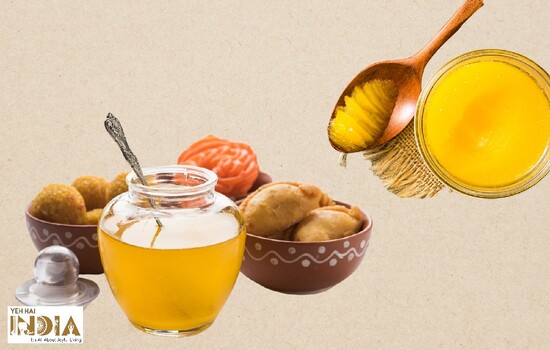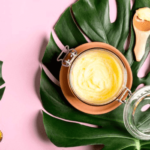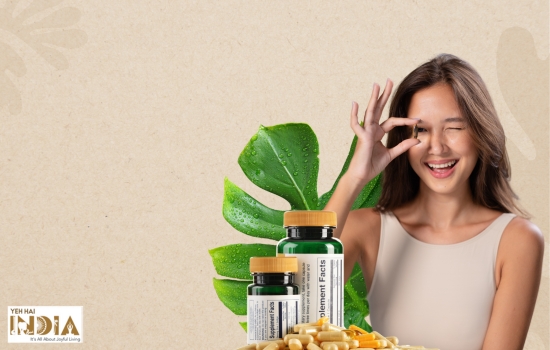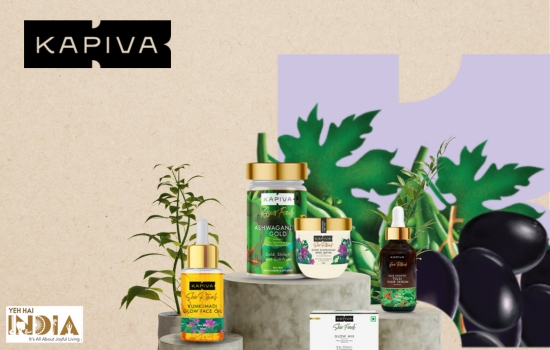Ghee is an excellent source of essential fatty acids and nutrients needed to support healthy body functioning.
Since the dawn of time, ghee, or clarified butter, has played a significant role in Indian cookery, besides being a crucial element in Ayurvedic treatments and medications.
Ghee is frequently seen as a healthy fat substitute that supports weight loss without losing out on essential nutrients. It is often dismissed as unhealthy and fattening, which it might be if not consumed in moderation.
Ghee is actually quite good for you if consumed within a recommended range, as only short-chain fatty acids are found in pure ghee. They are quite advantageous for health as they are easily digested and supply a healthy dose of crucial vitamins and minerals.
Keep in mind that we’re talking about pure, homemade ghee that’s devoid of preservatives.
The following information does not apply to store-bought or ghee produced through any artificial techniques.
Natural ghee is a type of clarified butter.
Simmering butter until the milk solids and water evaporate makes ghee. This leaves behind a pure butterfat that is high in vitamins A, D, E, and K.
Let’s look at why ghee is the new superfood you should include in your diet.
What makes Ghee beneficial for you?
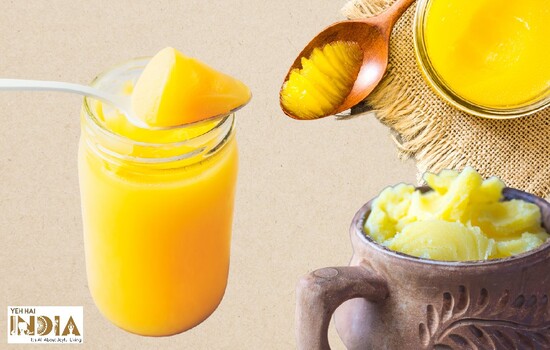
To learn about the health benefits of ghee, let’s start by examining its nutritional makeup.
Dietary fats are abundant, which makes them important for the body as vitamins A, D, E, and K are fat-soluble and require fat molecules in order to be digested.
Together, they are easily absorbed by our systems, allowing the body to employ these nutrients.
Ghee also contains CLA, i.e., conjugated linoleic acid, which is a fatty acid that contributes to better brain health by improving cognition and memory.
Advantages of Pure Homemade Ghee
- Improved absorption of vitamins.
- Better digestive health by reducing inflammation in the gut.
- Improved Heart health contributed by a high amount of monounsaturated fats.
- Protection from neurodegenerative diseases like Alzheimer’s and Parkinson’s disease.
- Better Skin health.
Regularly consuming pure homemade ghee increases both your physical and mental strength. By doing this, you’ll help your body stay healthy and ward off infections.
Being a good source of fat-soluble vitamins, it strengthens the tendons, muscles, and eyes, as fat-soluble vitamins are highly essential for the maintenance of cell membranes.
Most grocery store shelves are stocked with cholesterol-free oils for folks who have issues with cholesterol. When compared with butter, it appears to be a smarter choice because it contains fewer fats.
Ghee that is prepared at home and is pure lasts longer and doesn’t require refrigeration to preserve. Those who are lactose intolerant can safely consume this.
Recommended Story – Applying Ghee on Navel: 5 Benefits To Derive From This Health Ritual
Ghee and Weight Loss
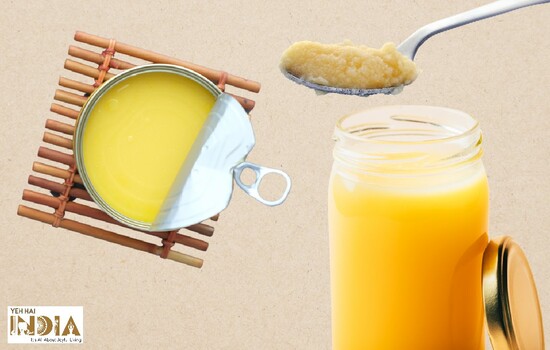
Recently, ghee consumption has become more popular among people who are watching their weight. This is due to ghee’s lower fat content and simpler digestion.
However, it is important to note that it is still a high-calorie food, so it is important to consume it in moderation.
Pure ghee is also believed to speed up digestion, which is likely to help with weight loss. Additionally, it brings your mind back into equilibrium and improves your brain’s performance.
The body needs specific fats for important processes like sustaining your nerves, skin, and mental health, defending the lining of your stomach from digestive acids, and fortifying cell membranes. Ghee serves all of these purposes.
The fats in ghee are also known to be devoid of hydrogenated oils, trans fats, and oxidised cholesterol. As a result, the fat in pure ghee is beneficial compared to refined oils, which are loaded with unhealthy fats.
However, ghee contains saturated fat, which can lead to increased cholesterol if overconsumed.
How to incorporate ghee into your diet?
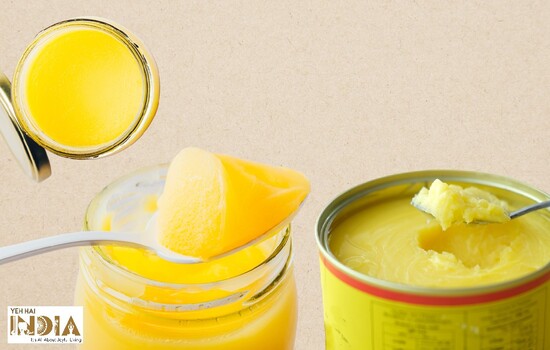
- Using ghee instead of oil to cook vegetables is a healthy alternative you might want to consider.
- Lycopene in tomatoes is more readily available to the body when cooked in ghee due to its high heating point and effectiveness in absorbing fat-soluble elements found in vegetables.
- When vegetables like carrots and greens are cooked in ghee, the vitamin A in those foods becomes easier to absorb.
- A simple yet effective way to use ghee is to smear it on chapattis to increase the nutritional value of your meals.
- When used as a tadka, ghee not only gives your favourite dishes an intensified flavour but also works to add a hint of health.
- Consuming milk with a teaspoon of ghee is an easy way to cure constipation.
- The best way to utilise the health-benefiting qualities of pure ghee is to use it uncooked in nutrient-dense laddoos like gond ka laddoo, alsi ka laddoo, and badam laddoo.
Things to Remember
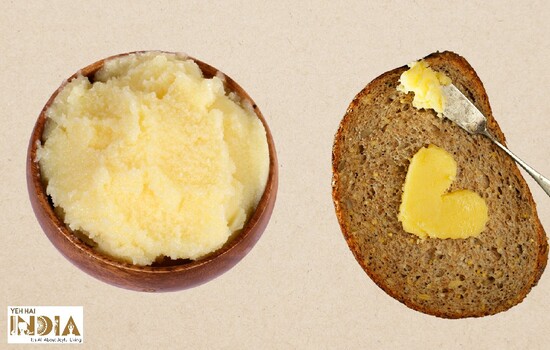
Since the recommended daily fat consumption ranges from 10 to 15 grams per day for a healthy adult.
Be aware of the recommendation as per your individual needs and physical activity level before adding it to your diet.
It is advised to speak to your nutritionist to determine how much fat you should consume on an everyday basis.
Be mindful of your fat intake if you have a history of cardiovascular disease or are overweight or obese.
Conclusion
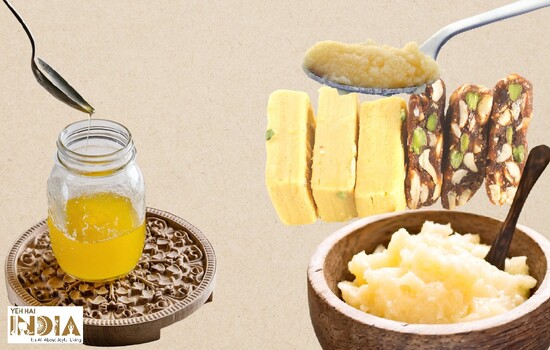
Ghee is a common ingredient in Indian cuisine and is found in many kitchens. It is a storehouse of vitamins and healthy fats that contribute to the healthy functioning of organs and strengthen the immune system.
Although there is no danger in taking it every day, excessive ghee consumption might result in a number of issues due to its high saturated fat content.
To reduce weight, limit your ghee intake to two or three teaspoons per day. To shed pounds and burn belly fat, be sure to eat a nutritious diet and exercise. When illnesses become a regular occurrence, ghee can be enjoyed in moderation as part of a healthy diet.
Also Read – Product Review: Advait Living’s Ayurvedic A2 Cow Ghee
Frequently Asked Questions
1. What is ghee, and how is it different from regular butter?
Ghee is a type of clarified butter made by simmering regular butter to remove the water content and milk solids. This process gives it a distinct nutty flavour and a higher smoke point compared to regular butter, making it suitable for various cooking methods.
2. Is ghee a healthier option than other cooking oils?
Ghee has been praised for its potential health benefits. It is rich in healthy saturated fats and contains essential fat-soluble vitamins like A, D, E, and K. It is also lactose and casein-free, making it a suitable option for individuals with dairy sensitivities. However, like all fats, moderation is key, and it should be consumed as part of a balanced diet.
3. What are the potential health benefits of consuming ghee?
Ghee is believed to support digestion, boost the immune system, and provide sustained energy due to its healthy fat content. It may also aid in nutrient absorption and promote a healthy gut. However, these benefits can vary from person to person.
4. Can ghee be used in a vegan or dairy-free diet?
Ghee is not considered vegan since it is made from dairy butter. However, it is suitable for a lactose-free or casein-free diet because the milk solids are removed during the clarifying process. People with lactose intolerance often find it to be a better-tolerated alternative to regular butter.
5. How should ghee be stored to maintain its freshness?
Ghee has a long shelf life due to its low moisture content and can be stored at room temperature for several months. However, for extended freshness, it is advisable to keep it in an airtight container in a cool, dark place. Refrigeration is not necessary and can cause the ghee to harden, but it won’t spoil if stored properly.


